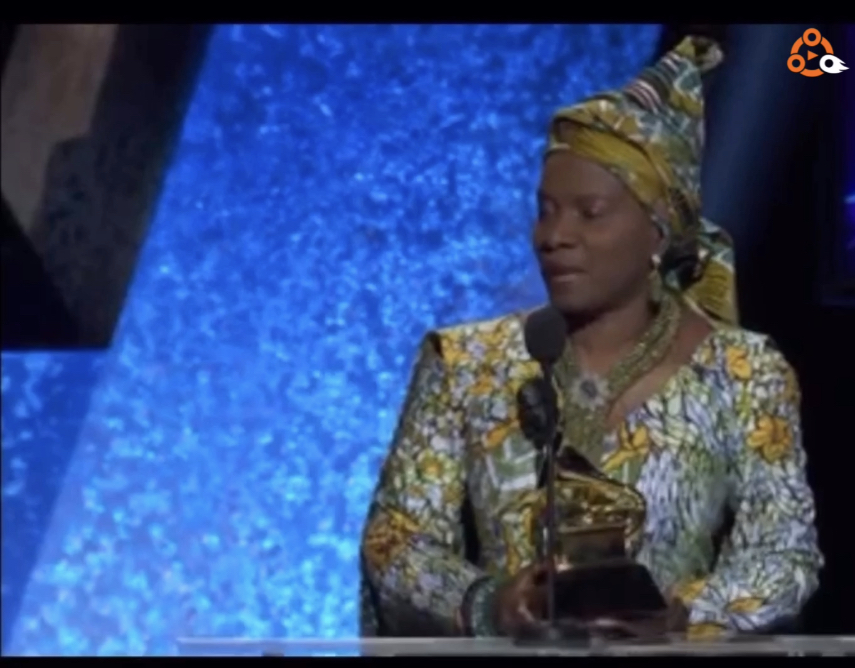
African music legend, Angelique Kidjo has emerged winner of the Best World Music Album at the 62nd Grammy Awards, a category where Burna Boy was also nominated.
The award which took place on the 26th of January, 2020 was Burna Boy’s first Grammy nomination and Nigerians and his fans all around the world were looking forward witnessing history with the African Giant as the winner.
Angelique Kidjo, during her acceptance speech of her 4th Grammy Award, stated that the time has come for Africans and she dedicated her award to Burna Boym saying that Burna is the crop of talented African artistes that are giving African a good global representation.
She said;
Four years ago on this stage, I was telling you that the new generation of artistes coming from Africa are gonna take you by storm and this is for Burna Boy. Burna Boy is among the young artistes from Africa that is changing the way our continent is perceived and the way African music has been the bedrock of every music.
Watch video;
Watch Burna’s spectacular performance;
Latest Contents
- Whiteman – Pray For Me
- Yung L – Tropicana Baby (Prod. TUC)
- Drey Beatz – Jeje (Prod. Drey Beatz)
- Dark Poet ft. Falz & M.I Abaga – Ripple Effect
- Soft – Bentley Benz Gucci (Official Video)
- DJ Neptune ft. Victor AD – Tomorrow (Official Video)
- G-Sound – Egwu Onwa
- Ycee – Vacancy (Official Video)
- Kida Kudz ft. Jaykae – 1am (Audio & Video)
- Fiokee X Teni X DJ Coublon – Osan
- DJ Neptune ft. Victor AD – Tomorrow
- Niniola – Omo Rapala (Official Video)
- Rema – Bad Commando (Lyric Video)
- Phyno ft. Falz & Phenom – Get The Info (Official Video)
- Jumabee & Fiokee – I Get God (Audio & Video)
- Orezi – Maza Maza (Official Video)
- MceeDon – Inamorata
- Mr Real – Baba Fela (Rv)
- Mr Real ft. DJ Lisa & DJ YK Beat – Lambalimbolamba
- Mr Real – Baba Fela
- Morell -Laila (Prod. T-Klex)
- Mr Real – General Of All Lmaba (Goal) EP
- Cobhams ft. Simi – We Plenti (Audio & Video)
- Zlatan – Quilox (Prod. Mansa Jabulani & Rexxie)
- Darkoo ft. Davido, Tion Wayne & SL – Gangsta (Official Video)
- Cobhams Asuquo – New Beginning
- Boi Dimix – Soke (Audio & Video)
- Dotman – Awe (Official Video)
- Eva Alordiah – Friend Or Foe (Audio & Video)
- MC Galaxy – Ije Ego (Official Video)
- Mr Real – Onigbese (Prod. RJ Beatz)
- Jayslot – The First Dimension (Album)
- Slizzy E – E Pain Dem (Prod. Spurztunez)
- Danagog – The Lord’s Prayer (Audio & Video)
- Davolee ft. Limerick, Picazo & Yomi Blaze – Indigenius (Cypher)
- Naira Marley – Tesumole (Official Video)
- FTE – No Sabi Cook (Official Video)
- Danny Dreams – Wunmi
- PsychoYP – Elevate (Official Video)
- Yung6ix ft. Charass – Body
- Yemi Alade – Lai Lai (Official Video)
- Terry Tha Rapman – Kapenta of Lagos
- Dammy Krane & Sunzi – Pay Me My Money (Remix 2.0)
- Danagog – Xmas Trees Intro (Official Video)
- Nappy Girl – Paper (Official Video)
- Burna Boy – Money Play
- Jhybo – Yes/No (Audio & Viral Video)
- Dammy Krane ft. Medikal & B4bonah – Pay Me My Money (Remix)
- Wizkid (Starboy) ft. Blaq Jerzee – Blow | Official Video
The post Angelique Kidjo Wins Grammy & Dedicates Her Award To Burna Boy, Watch VIDEO appeared first on Latest Naija Nigerian Music, Songs & Video - Notjustok.
from Latest Naija Nigerian Music, Songs & Video – Notjustok
via EDUPEDIA
Comments
Post a Comment